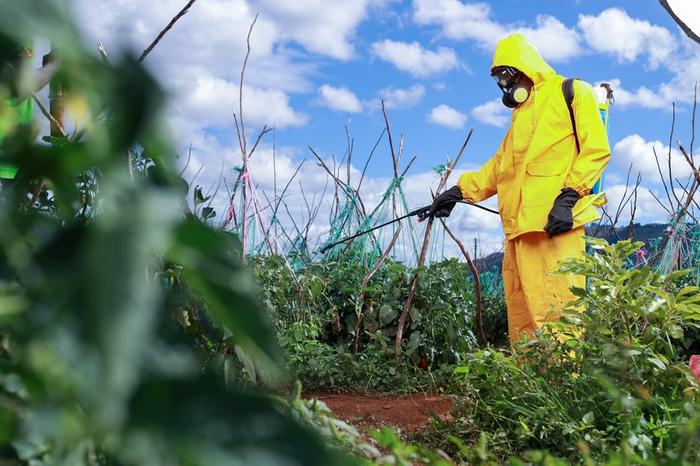A CABI-led study has revealed that participation in the Zambia Farmer Input Subsidy Programme (FISP) – particularly the flexible e-voucher system – encourages synthetic pesticide use at the expense of sustainable practices.

Credit: CABI
A CABI-led study has revealed that participation in the Zambia Farmer Input Subsidy Programme (FISP) – particularly the flexible e-voucher system – encourages synthetic pesticide use at the expense of sustainable practices.
The research found that farmers consider synthetic pesticides and biopesticides as substitutes against the fall armyworm (Spodoptera frugiperda) pest and are more likely to adopt sustainable pest management when they have tenure security and access to financial resources.
Dr Justice Tambo, Senior Socio-Economist at CABI’s Swiss centre in Delémont, and Professor Saweda Liverpool-Tasie, of Michigan State University, published the outcome of their study in the Journal of Agricultural Economics.
Less likely to adopt preventative cultural measures
The scientists sought to assess the effects of FISPs on smallholder farmer adoption of sustainable pest management practices, using data from 1,048 smallholder maize plots across the major maize-producing zones of Zambia.
They found that households that participated in FISPs are about 106 percentage points less likely to regularly monitor their farms for early detection pest infestation and are 125 percentage points less likely to adopt preventative cultural measures, such as intercropping and rotation with non-host plants, field sanitation and trap cropping.
Moreover, while FISP participation is significantly associated with a 67 percentage points higher probability of a household controlling fall armyworm using synthetic pesticides, it is not significantly related to the adoption of biopesticides, which are considered a safer and low-risk alternative to synthetic pesticides.
Dr Tambo said, “We find consistent evidence that input subsidy receipt is negatively associated with smallholders’ adoption of environmentally friendly and sustainable pest management practices.
“Given the human and environmental health consequences associated with synthetic pesticide use, it would be important to leverage input subsidy schemes to promote the adoption of safer and more sustainable alternatives to synthetic pesticides.”
Contentious policy tool
ISPs remain a popular but contentious policy tool to promote agricultural intensification, food security and poverty alleviation across Africa. Although previous studies have explored the impact of ISPs on various smallholder outcomes, none have analysed the impact of recent ISPs on pest management.
Dr Liverpool-Tassie said, “This is particularly important given the increasing pest challenges due to climate change and the recent surge in pesticide use in low-income countries and its associated negative consequences for human and environmental health.
“Beyond input subsidies, policies that improve tenure security and financial access for smallholders can promote the adoption of sustainable pest management practices.”
Dr Tambo and Dr Liverpool-Tassie point out that, in the wake of outbreaks of devastating pests, such as fall armyworm, many developing-country governments have gravitated to the provision of synthetic pesticides to farmers through subsidy schemes.
Promotion of sustainable Integrated Pest Management
They highlight that, given the potential dangers of synthetic pesticides and the limited use of protective equipment by smallholder farmers when handling pesticides, several studies have argued that subsidies for pesticides should be geared towards the promotion of sustainable Integrated Pest Management (IPM).
IPM involves the use of a combination of pest management techniques, including biological, cultural, mechanical and pest monitoring practices, as well as pesticides, which should be considered as a last resort.
Dr Tambo said, “The significant effects of FISPs on increased use of synthetic pesticides is driven by the flexible e-voucher programme where beneficiary farmers can redeem vouchers for a wide range of subsidised farm inputs, including synthetic pesticides, from registered agro-dealers.
“We also found heterogeneous effects of the subsidy programmes on the adoption of non-chemical IPM practices. Results also showed that households with access to secure land tenure, credit and off-farm income earning activities, as well as those in low rainfall environments, where fall armyworm infestation tend to be greater, are more likely to invest in IPM practices.”
Improving input subsidy programmes
The scientists conclude by emphasising the need to leverage input subsidy programmes (ISP) to promote safer and more sustainable alternatives to synthetic pesticides. For example, the FISP beneficiaries who choose to redeem their vouchers for pesticides could be required to opt for biopesticides rather than synthetic pesticides.
“Alternatively, higher subsidy amounts could be offered to those using biopesticides to encourage adoption. A good example that might be worth emulating is China’s ‘Green Pest Control’ policy that provides subsidies on lower-risk crop protection products, including biopesticides (Wei et al., 2019)” Dr Liverpool-Tassie said.
“Another potential strategy is to ensure that the array of items redeemable through the FISP include PPE items and non-chemical pest management inputs, such as biocontrol agents, pheromone traps and pest tolerant varieties.”
Additional information
Main image: Input subsidy receipt is negatively associated with smallholders’ adoption of environmentally friendly and sustainable pest management practices (Credit: CABI).
Full paper reference
Tambo, J.A. & Liverpool-Tasie, L.S.O. (2024) Are farm input subsidies a disincentive for integrated pest management adoption? Evidence from Zambia. Journal of Agricultural Economics, 00, 1–24. Available from:
Funding acknowledgement
This work was supported by the CABI Development Fund (CDF) and the PlantwisePlus programme. CABI is an international intergovernmental organisation, and we gratefully acknowledge the core financial support from our member countries (and lead agencies). See www.cabi.org/about-cabi/who-we-work-with/key-donors/ for full details. This study was also made possible with support from the US Department of Agriculture National Institute of Food and Agriculture and Michigan State University AgBioResearch, MICL12077.
CABI Working Paper
See also the CABI Working Paper ‘Implementing Agri-policies on Pesticide Reduction through Subsidies and Plant Clinics in China.’
Journal
Journal of Agricultural Economics
Method of Research
Experimental study
Subject of Research
Not applicable
Article Title
Are farm input subsidies a disincentive for integrated pest management adoption? Evidence from Zambia
Article Publication Date
23-Apr-2024
Discover more from Science
Subscribe to get the latest posts sent to your email.


